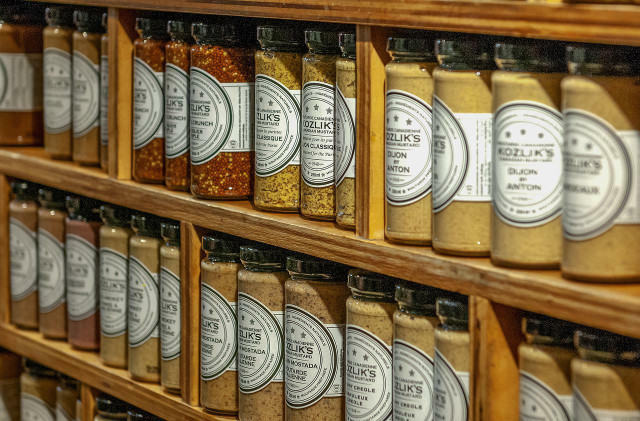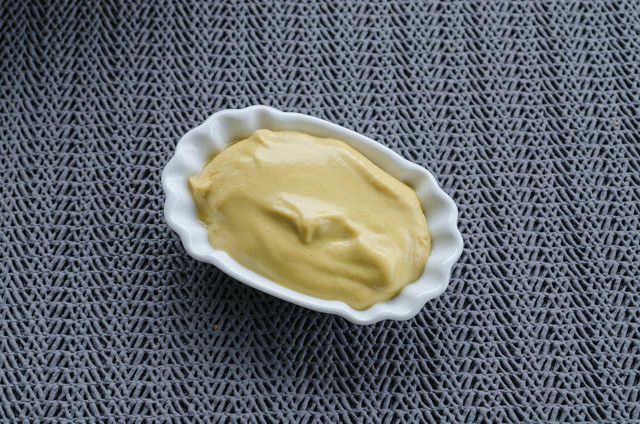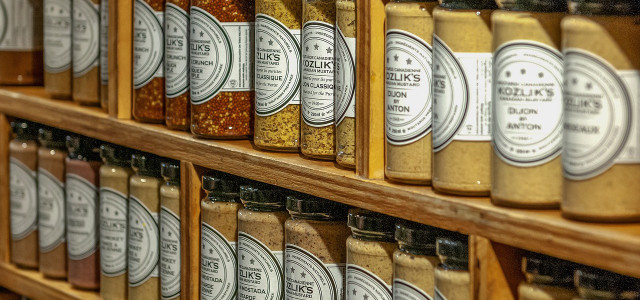An essential condiment alongside ketchup and mayonnaise, mustard is a kitchen staple. But does mustard go bad? How can you tell when it spoils? Learn more here.
Whether you regularly eat mustard or not, you will likely end up with a neglected, partially empty jar of mustard in the fridge at some point. If your mustard has been in there untouched for a few weeks or even close to a year, knowing how long it can last, when it has spoiled, and if you can extend your mustard’s shelf life will help you reduce your over all household food waste.
Mustard is made from three different types of mustard seed — Sinapis alba (white or yellow), Brassicar juncea (brown) and Brassica nigra (black). Flavors will vary from mild to fiery, with the general rule being the darker the seed, the more punchy the flavor will be. Yellow mustard would have to be the most popular type, although other favorites include Dijon, honey mustard and whole grain.
Although a member of the mustard family, wasabi is actually made from Japanese horseradish roots or rhizomes, rather than from the seeds. It still packs much of the same punch as hotter mustard and is a traditional condiment used with sushi.
Does Mustard Go Bad? Tips for Spotting Spoiled Mustard



Mustard typically comes with a shelf life of one year before opening, sometimes even lasting past the expiry date. An open jar of mustard will still be good to consume for months after first opening it, provided you keep it stored in the fridge. Any mustard left at room temperature will obviously expire more quickly, and after two months or so it would be best to dispose of it.
Keeping your mustard in the fridge will help it last for longer and retain its punchy flavor, but you don’t need to keep it in the fridge. Mustard kept outside the fridge tends to dry out more quickly, but so long as there is no bad smell detected, giving the mustard quick stir to maintain its consistency is a good way to keep it for a little longer.
So how do you know of your opened mustard has gone bad? Take a look at it first, if you notice any change of appearance, in particular the appearance of mold, it should be thrown away. However, mustard may not always develop mold, so if notice an unpleasant odor or that the mustard has dried out so much that it clumps, you should probably throw it away.
How To Keep Mustard Fresh



If you want to make your mustard last for longer, these simple tips will ensure you get the most of it every time.
- Eat all of your mustard before the expiry date. This is the best way to consume your mustard, as it reduces waste.
- Use clean utensils when scooping mustard out of the jar. Unclean spoons or knives may carry mold spores or bacteria, which will potentially multiply in the mustard, leading to quicker spoiling.
- Store at cooler temperatures. Most types of mustard don’t need to be refrigerated after opening, but storing it at a colder temperature will lock in the tangy flavors for longer and will greatly reduce the chance of the mustard drying out or developing mold.
- Keep it out of direct sunlight. If you prefer to keep your mustard at room temperature before eating, that’s fine, just store it in a cool dry place such as the pantry, and keep it out of the sun.
Different Storage Tips For Different Mustards



Homemade Mustard
Because homemade mustard usually has no preservatives, you can expect it to last only for a day or two at room temperature. Because of this, you should always store it in the fridge, where it will last for up to two weeks, depending on the container you are using and the ingredients included in your homemade recipe.
Dry Mustard Powder
Mustard powder will remain fresh and tasty for up to two years when stored on the shelf. And if you opt to keep your mustard powder in the fridge, you can keep it fresh indefinitely.
Honey Mustard
Great with salads and grilled fish, honey mustard is much like other mustard and will last for nearly three years when unopened and kept at room temperature. If you store it in the fridge after opening, expect honey mustard to last for nearly two years.
American Mustard
This national favorite will normally last up to two years beyond its expiry date if left unopened and stored properly at room temperature. After opening it will be good to consume for a least a year when stored in the fridge.
Dijon Mustard
Dijon mustard comes with a high vinegar content, allowing it to last for around two to three years when unopened and stored in the pantry and for a year after opening when kept in the fridge.
Chinese Mustard
Lovers of Chinese mustard will likely already know that this can last for up to two years when stored unopened in the pantry and like most other mustard after opening, Chinese mustard will be good for a year in the fridge.
Read more:
- Homemade Vegan Black Bean Burger and Other Tasty Vegan Burger Recipes
- Wasabi Mayo: An Easy (and Vegan) Recipe
- Are French Fries Vegan? McDonald’s Fries Aren’t – Find Out Why Here
Do you like this post?








